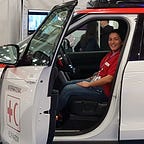From Emergency Response to Innovation
Christina is an Emergency Response Officer for the British Red Cross, who has been seconded to the organisation’s Innovation Hub for six months.
My colleague and I often talk about the differences in culture and way of working in front-line services to the Innovation team. But what do we really mean?
If you have been on the ground during an emergency or sat in an operations room to support the people on the ground, you understand the hectic atmosphere, as Laura shared in her blog post. Not only that, during an emergency you would be used to following a set of command structures and have a tangible task list to get through. Emergencies are all complex in their own way and require you to be flexible, but joining the British Red Cross Innovation (Hub) team has been a different challenge.
In my previous role as Emergency Response Officer my colleagues would probably describe me as innovative, due to being a bit tech savvy and the promoter of post-it note meetings…Classic innovative stuff…right!?
However, the reality of going into less a structured environment and the chance to think about your workflow properly is different. I had to challenge myself and my ways of working. Honestly, I felt quite lost at first but here are some of the culture changes that a few months in I have valued about working with the Innovation team and the Visible in Emergencies project.
Rounds
Through rounds there is an opportunity in every task we do to voice our opinions and have them taken on board straight away. Rounds are very important since they give people the chance of being asked about their opinion. It’s OK not to have anything to say but then it’s up to that individual to decline rather than being skipped completely.
It’s quite unusual to have something actioned so quickly, and openness in the team to try something new and change things if necessary.
Transparency
There are no secrets to our work. We work in the open and welcome the input of passing colleagues.
We have our blog that is outside of our regular Red Cross forums so that anyone can find out what we are working on. We also have interactive meetings such as idea sessions where we invite other stakeholders to support the development of the project and to add their knowledge.
Connection
Spending quality time on a task with our colleagues leads us to really understand each other’s thoughts and ideas, which leads to better productivity when working together. In Emergency Response it is equally important to have a good connecting with fellow responders, but we don’t always have the time to do this. I have learned to appreciate the quote “User research is team sport” and below you can see the things we all do as being part of the team.
Value other opinions
We have daily stand-ups where we discuss what we worked on yesterday and what we are going to do today. The best part is the two following questions: do you have any blockers and what’s worrying you. Having a safe space and a set time where you can air your thoughts and potentially get workload support is great. Furthermore, there are weekly retrospectives (on a Friday) which has proven to be very useful in continuing working in a more agile way. The three questions asked during this hour-long session are: what’s working, what isn’t working and Thanks. I really appreciate ending the week on a positive note, thanking my colleagues and being thanked for the everyday things we might not always recognise as impactful for someone else.
Task list
In the new team our task list is a lot shorter which felt strange at first, but we now value this a lot since we feel that the workload is manageable, and you feel good at the end of the day when you have managed to finish your tasks and do them really well. Some of our tasks involve work that is done tech free and we have a less heavy email burden which allows us to really focus on doing the tasks. It refreshing to have these differences and we feel that we are getting a lot more done.
I look forward to taking my learning back into Emergency Response and hopefully after my experience in the team I can call myself innovative.
